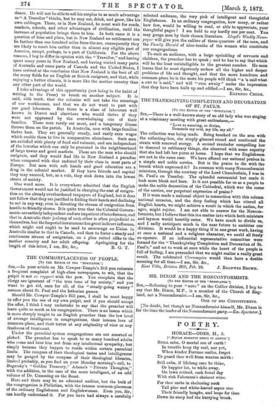THE COMMONPLACENESS OF PEOPLE.
[TO THE EDITOR OF THE " SPECTATOR:1
Sia,—In your article on Mr. Cowper-Temple's Bill you reiterate a frequent complaint of high-class newspapers, to wit, that the pulpit is not en rapport with the pew. You complain that the clergy are ignorant of "the true tone of lay society," and you want to get rid, once for all, of the "steady-going watery" sermon about St. Paul and the Isthmian games.
Should Mr. Cowper-Temple's Bill pass, I shall be most happy to offer you the use of my own pulpit, and if you should accept the offer, I think I may undertake to say that the preacher will learn quite as much as his congregation. There is no lesson which is more sharply taught to an English preacher than the low level of average intelligence in congregations, their intense love of common-place, and their terror at any originality of view or any freshness of treatment.
Under the parochial system congregations are not assorted or picked. The preacher has to speak to so many hundred adults who come and hear him not from any intellectual sympathy, but simply because they happen to reside within certain parochial limits. The compass of their theological tastes and intelligences may be gauged by the compass of their theological libraries, limited probably, as you find on your Monday morning's call, to Bogatsky's "Golden Treasury," Adams's "Private Thoughts," with the addition, in the case of the more intelligent, of an odd volume of Dr. Cumming on the Beast.
Here and there may be an educated auditor, but the bulk of the congregation is Philistine, with the intense common-placeness of the ordinary Englishman and Englishwoman. Even you, Sir, can hardly understand it. For you have had always a carefully


































 Previous page
Previous page